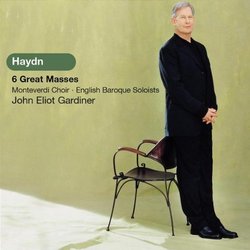| All Artists: Joseph Haydn, John Eliot Gardiner, Monteverdi Choir, English Baroque Soloists Title: Haydn: Six Great Masses Members Wishing: 0 Total Copies: 0 Label: Philips / Decca Original Release Date: 1/1/2000 Re-Release Date: 1/13/2004 Genre: Classical Styles: Opera & Classical Vocal, Chamber Music, Historical Periods, Classical (c.1770-1830) Number of Discs: 3 SwapaCD Credits: 3 UPC: 028947510123 |
Search - Joseph Haydn, John Eliot Gardiner, Monteverdi Choir :: Haydn: Six Great Masses
 | Joseph Haydn, John Eliot Gardiner, Monteverdi Choir Haydn: Six Great Masses Genre: Classical
|
Larger Image |
CD Details |
CD ReviewsHaydn for the new millennium Larry VanDeSande | Mason, Michigan United States | 11/18/2004 (5 out of 5 stars) "I am not an unabashed supporter of John Gardiner and his period style with choral music from the Baroque, Classical and Romantic periods. I enjoyed his versions of the Beethoven "Missa Solemnis" and Verdi "Requiem Mass" but did not enjoy his traversal of the Bach cantatas or Haydn's "Creation". This split decision left me wondering if purchasing this set would be wise. Turns out it was very wise, indeed, for these are startlingly good performances of Haydn's "Big Six" masses -- the Harmony, Helig, Nelson, Creation, Theresa and Pauken (or kettledrum) masses. In these three disks, Gardiner, a group of now well-known soloists, the Monteverdi Choir and English Baroque Soloists acquit themselves well across the board. There is no mention in the notes or on the sleeve whether or not the soloists use period inmstruments. The strings sound good, not wiry as is often the case with period instruments. The singers consistently use vibrato. The English notes to this set describe the history of creation of each mass and describe their musical progressions. There are no notes about the performers and arty pictures of Gardiner grace the front panel of cover of the booklet. I think it is reasonable to call this a new millennium update of the famous Decca-London set from the 1960s by performers including Simon Preston and George Guest. Spiritually, the newer set is a natural upgrade informed by period style -- if not always performed in same -- and produced in 21st century DDD sound. The singers and orchestral members all perform wonderfully and Gardiner's direction is always appropriate with that little bit of reserve always apparent that separates the temperament of Haydn from that of Beethoven. While there is no question this is a five star offering, I nevertheless have a few minor quibbles with it. The recordings are tastefully produced in modern natural style, which places the singers and chorus equidistant. I would have appreciated a bit more forward placement for the singers. In addition, I would argue that the pronunciation of the Latin words suscipe and excelsis are incorrect. There are several ways to say suscipe and Gardiner apparently has chosen su-she-pay. I would argue su-see-pay is correct. The choristers and solosits regularly say eck-shell-sis instead of the correct eck-sell-sis, also. Finally, I would have appreciated a bit more embellishment of the timpani in the closing pages of the "kettledrum" mass. It is, after all, named after the instrument! But these are minor reservations in a set that has all the qualities to be a classic for this age and hold steadfast in the top rung of Haydn masses for another quarter-century. Compared to the version I have heard by Richard Hickox, I would say this set is clearly superior in all ways. I heartily recommend this nicely-priced three disk set to anyone that wants to discover -- or rediscover -- the glories of Haydn's late masses." In response to previous reviewer... Brian | SUNY Potsdam, NY | 03/26/2006 (5 out of 5 stars) "Your ideas concerning the pronunciation of the latin refer to the German pronunciation of the text. Gardiner chose to utilize the Italianate pronunciation, which is certainly not "incorrect." The Italianate pronunciation is typically used in the Roman Catholic Mass, and these are most certainly Masses. Just wanted to clear that up. In terms of the recording, I too shared some reservations, as I've been enamoured with Gardiner's rendition of the Verdi Requiem (though I think Abbado, on EMI, is more intense, and his soloists are superb), and extremely disappointed with his "performance" of Bach's St. Matthew Passion (that one seemed like he really had to use the bathroom, and wanted to wrap things up ASAP). However, this is quite a fine recording. The soloists are excellent, tempi are nice and brisk (though not rushed, as has often been the case in other Gardiner recordings), and it's great to have these six wonderful Masses together in one set. Though Bach's B minor Mass is THE supreme liturgical work, these Haydn creations are nothing short of extraordinary." Astonsihing music and scintillating conducting Aquinas | celestial heights, UK | 09/02/2009 (5 out of 5 stars) "Returning to these masses after nearly a five year gap, I was astounded at how wonderful they are - this is trully ecstatic music but also at the same time playful joyful and just full of the joy of being. And, Gardiner simply attacks the music bringing out the wonderful orchestration. In my view, Haydn surpasses Mozart in this music (leaving aside the Da Ponte operas, of course). I used to have favourites of these masses and to some extent some I love more than others but they all musically spell out the joys and giftedness of being. What an extraordinary way for Haydn to end his career, right at the top!"
|

 Track Listings (23) - Disc #1
Track Listings (23) - Disc #1